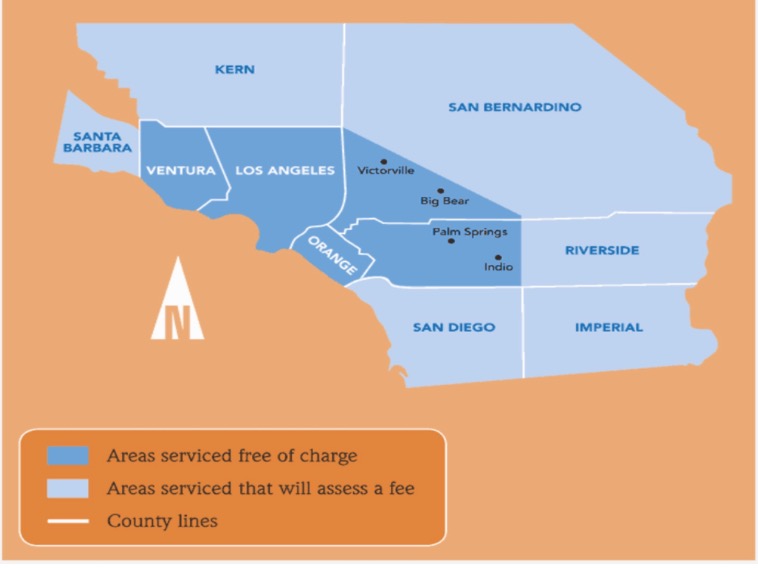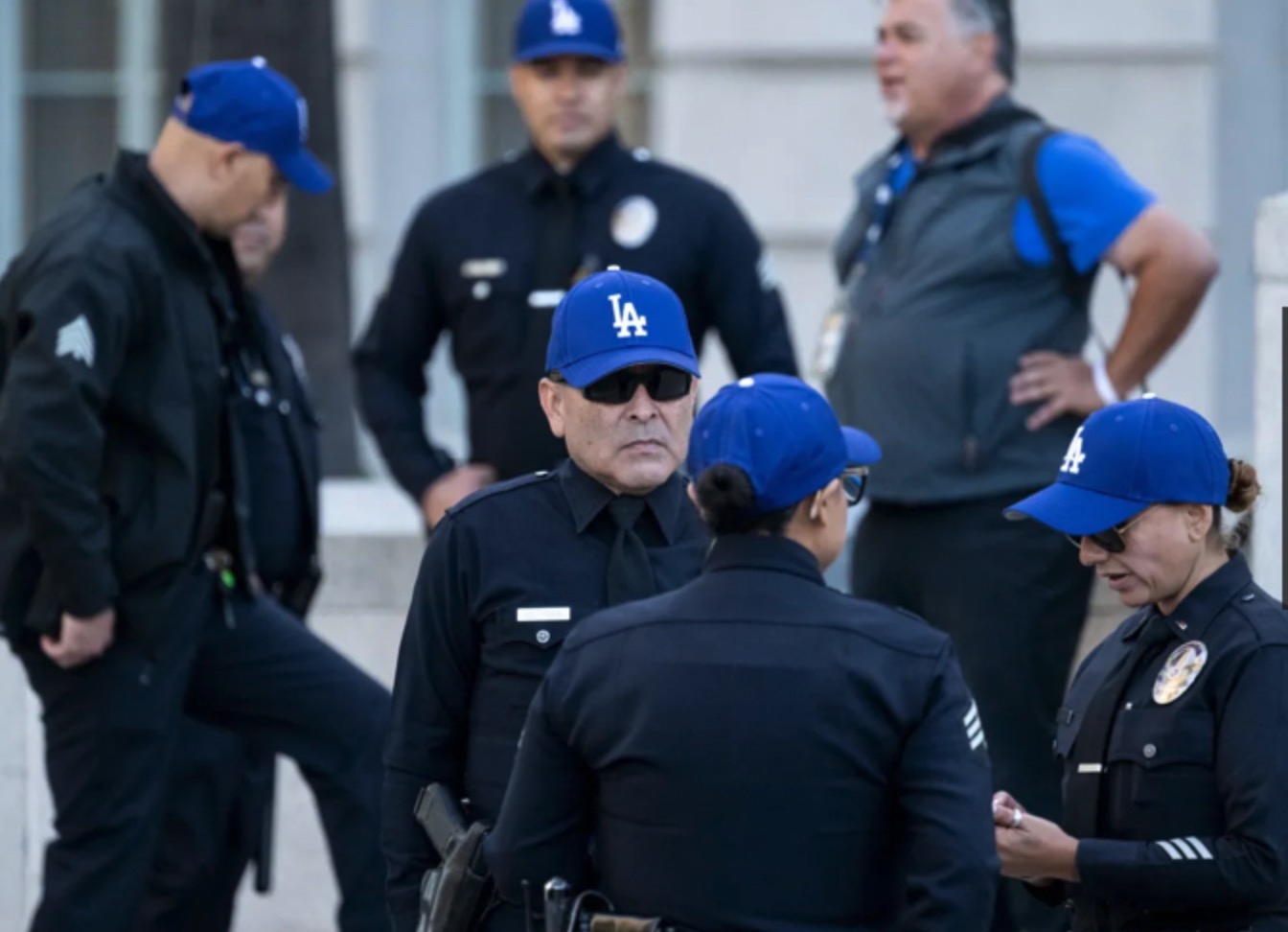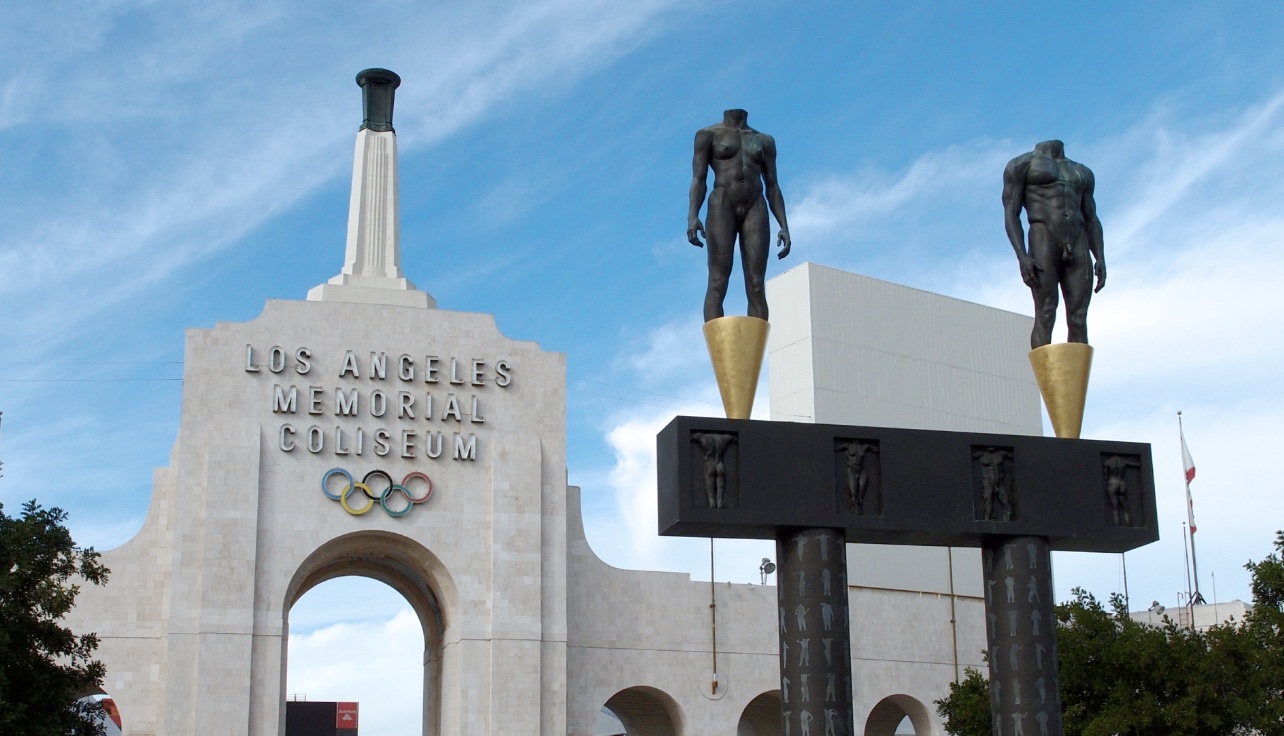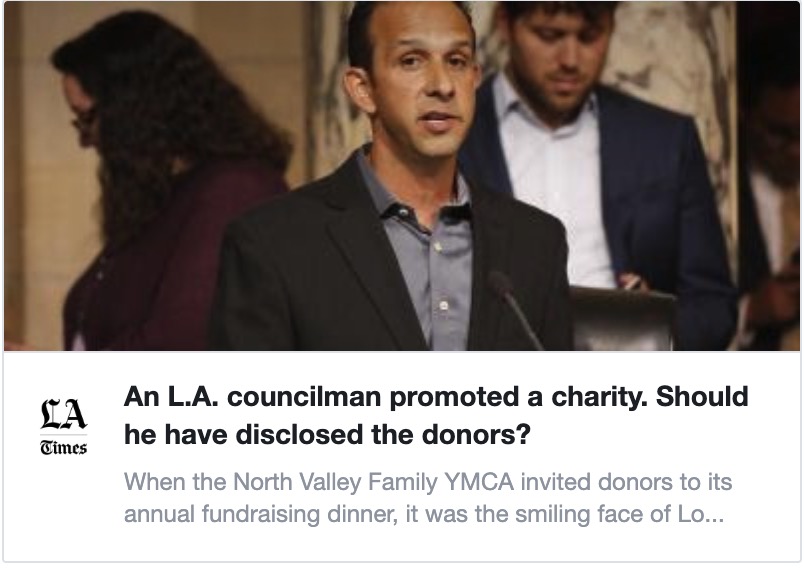Comments
ERIC PREVEN’S NOTEBOOK - As I was preparing for Tuesday's civic engagement activities, I went to the LA Times website and was once again barraged with ads paid for by (Committee ID: 890198).
It's perfectly legal, but certainly not what you'd call "a level playing field."
I looked it up and the total donation of $698,837.00 from various airlines was directed to the Central City Association Political Action Committee, which supports Adrin Nazarian (wannabe CD2) and Heather Hutt (CD10) in their campaigns for Los Angeles City Council 2024 (Committee ID: 890198).
Nella McOsker is the President & CEO of Central City Association (CCA) and an Alumna of the Coro Foundation as well as a daughter of City Councilmember, Tim Mcosker. These contributions were facilitated through Airlines for America as an intermediary.
Here is the breakdown of donations by each airline:
Alaska Airlines: $19,274.00
Delta Airlines: $187,011.00
Hawaiian Airlines: $68,124.00
JetBlue Airways: $104,838.00
Southwest Airlines: $55,778.00
United Airlines: $263,812.00
Total: $698,837.00
No on Measure G:
No on all the City Measures:
Rumor has it we’re considering signing off on an $80 million Judgment Obligation Bond, huh? Just another Tuesday in Los Angeles, where our fiscal "strategy" is apparently “kick the can down the road.” This proposal isn’t just irresponsible—it’s practically a masterclass in bad governance. Rather than addressing the root issues behind these costly lawsuits, like neglected street repairs or underfunded animal shelters, we’re borrowing to cover the fallout. And with a cool $20 million in interest on top? Well, why not, right? Just pile it onto the taxpayer tab!
Let’s call this what it is: a debt hamster wheel. We’re all crammed in, running toward a cliff of compounding interest and eroding services, as each cycle of “borrow now, regret later” grows the hole even deeper. But you know what really grinds the gears? The public isn’t just paying for this; they’re practically locked out of the process altogether.
Council President Krekorian (CD2) casually flicked away virtual testimony for committee meetings, all while generously offering Spanish translation in a few select sessions. It’s a cute trick—offering one access point while quietly closing another. And Councilmember Blumenfield (CD3), Mr. “Decarbonize the Zoo,” seems more interested in pet projects than letting the public actually weigh in on decisions that affect them. If this council’s idea of democracy is muted microphones and closed doors, then maybe it’s time to re-evaluate what we’re doing here.
Which brings me to the big black box in the room: labor negotiations. These deals are cooking up the budget deficit behind closed doors, and nobody’s got a clue until the bill comes due. Other cities have figured this out—they’ve opened up negotiations to the public. Imagine that: transparency. Mayor Bass, take a note. We’re not asking for a front-row seat to the backroom deals; we’re just asking to be looped in before you hit “buy” on $80 million in judgment bonds.
Instead of this financial death spiral, here’s a thought—how about a ballot measure that bans labor agreements from pushing us further into the red? Let’s make sure these deals are fully funded before the ink dries, instead of crossing our fingers and hoping “extra revenue” materializes.
And please, for the love of fiscal sanity, let’s stop relying on this fantasy budgeting where every year’s revenue projections are a Hallmark card wish. How about we take a page from cities that use real numbers, realistic projections, and actual oversight?
If you want a city that won’t fall apart the second we hit a speed bump, we need structural reforms, not this slapdash borrowing. The choice is simple: we can either keep walking this path of fiscal recklessness or we can finally build a budget based on realism, transparency, and some accountability.
Los Angeles deserves better than this, and Angelenos deserve a council that doesn’t just govern for the next news cycle. It’s time to ditch the debt games and take a hard look at where this city’s headed.
Item 17:
The motion in Item 17 on Tuesday directs the Bureau of Street Services to evaluate and potentially expand street sweeping services in Los Angeles, including updating signage and assessing costs for areas currently without such services. While the primary focus is on improving cleanliness and service coverage, it's important to note that parking enforcement during street sweeping contributes significantly to the city's revenue. In the first half of 2024, approximately 241,881 tickets were issued for parking in street cleaning zones, generating substantial income for the city.
Smart Speaker: Holy crap! Therefore, any expansion of street sweeping services could also lead to increased parking enforcement and associated revenue.
Item 28:
This item proposes that $30,000 from the AB1290 Fund No. 53P, Account No. 281210 (CD 10 Redevelopment Projects - Services) be transferred and appropriated to the Transportation Proposition A Local Transit Fund No. 385/94, Account No. 94A226. This funding is intended for supplemental charter bus services within Council District 10. Heather Hutt, during an election.
Smart Speaker: What is Supplemental charter bus service, you ask? It's when a council member wants to provide free Supplemental Bus transportation to groups that are organized and apply for the funding through DOT.

Your group can order a supplemental bus from a cooperative city council member.
Question: Are they voters?
No questions.
Majority Protests:
Item 8 relates to a finding of a majority protest in Council District 15 for the 10th Street and Cabrillo Avenue Street Lighting District.
Item 6 relates to a finding of a majority protest in Council District 5 for the Louise Avenue and Otsego Street Lighting District.
Kudos to the resistance!
Be sure to tip Katy Yaroslavsky (CD5) and Tim Mcosker (CD15) on your way out.
Sprucing up internal misconduct! + Connecting the Dots
The Los Angeles Fire Department (LAFD) recently admitted a critical failure in its outdated Complaint Tracking System (CTS), crucial for handling internal misconduct cases. To address this, LAFD has signed a six-month, $250,000 contract with Spruce Technology, Inc., to develop a more reliable system—but the request oddly appears retroactive. Spruce, however, isn’t new to city contracts; beyond LAFD, it holds a $9 million deal with the Department of Building and Safety (LADBS) and two $5 million contracts with the Information Technology Agency (ITA) for “on-call” services, embedding itself across multiple departments with minimal competition.
While monopolization may not be illegal, expecting the City Council to prevent one vendor from monopolizing city services is a tall order. History shows that without rigorous oversight, “efficiency” can quickly morph into an unaccountable giant, draining taxpayer funds with scant transparency.
The solution? Public scrutiny. Engaged critics willing to dig and question provide the accountability that’s sorely needed. Without it, potential abuses go unchecked, and leaders sidestep transparency. We need clear disclosures and full transparency on contracts—otherwise, this so-called “progress” is just unchecked monopolization piling on costs. Paul Krekorian and Monica Rodriguez, it’s time to prioritize transparency—
Sergeants!

Boys in Blue, too!
Muddy Waters Homeless Funding:
Governor Newsom reminded as he touted his effort to shake loose another $827 million dollars to address homelessness in 37 jurisdictions. "The state has stepped up in ways the state has never stepped up in the past." he said. "I remind everybody that the state of California was not invested in the issue of homelessness until just a few years ago. The state was absent. When I was mayor of San Francisco, the state offered no measurable support to address the crisis of homelessness that has persisted for decades and decades here in our great state."
According to KNX, the plan will result in $160 million additional dollars for the city and $97 million for the county with additional funds for Long Beach, Glendale and Pasadena. The plan calls for monthly reports on spending and outcomes to be posted on a state website where the public can track the spending and outcomes--
Smart Speaker: Interesting, quick question for Council President Marqueece Harris-Dawson.
No questions.
Smart Speaker: If we are seeking monthly reports, but cannot ask questions...
No.
Smart Speaker: No. Can we at least get your agreement to allow people to call in testimony to city committee hearings?
No. Get him out of here!
Independent Oversight or Independent Overlooking? How L.A.’s Fake Reform Hurts Accountability
Last November, LA City Council member Kevin de León urged approval for a multi-million-dollar lease for sanitation operations in his district, assuring the council it would support more frequent encampment sweeps. Conveniently, the day after the lease was approved, David Solomon—a top executive at the leaseholding company—donated $900 to De León’s re-election campaign, followed by another $900 months later. While Solomon’s money was ultimately returned amid an ethics probe, this cozy back-and-forth exemplifies what’s broken in California’s system of “independent oversight.”
Attempts to curb pay-to-play politics hit walls every year. Recently, legislators blocked SB 24, which would have put public funding for campaigns on the ballot, and AB 270, which aimed to tighten foreign influence in campaign contributions. Instead of making real reforms, legislators are content with toothless ethics “oversight” bodies.
Just look at Metro: a multi-billion-dollar behemoth with a sprawling board structure and its own ethics provisions, recently neutered by AB 3123. The new bill strips away limits on gifts, speech payments, and income disclosures, leaving board members freer to accept money with little transparency. Even Metro’s ethics officer—a team of seven charged with maintaining some semblance of accountability—was left scrambling to address mounting conflicts of interest.
Smart Speaker: Didn't the Inspector General over there resign claiming she was retaliated against when she blew the whistle--
Get him out of here!
This pattern is clear: when oversight is weak or fake, it turns into “independent overlooking.” Without reasonable, enforceable rules, the public will never be able to effectively catch those bending (or outright breaking) ethics laws to suit their own interests. We’re told matching funds programs will level the playing field, yet they’re nothing more than an incumbent-friendly cushion, difficult for everyday challengers to access and riddled with loopholes. And let’s be honest: no one in elected office is lining up to swear off big-dollar donations.
The sad truth is, without real reform, the system won’t change. California’s politicians need to pledge to stop taking these corrupting donations altogether—but that’s not happening anytime soon. Until then, it’s up to voters to connect the dots and hold leaders accountable. We can’t rely on the illusion of independent oversight when our elected officials refuse to back genuine reforms. In L.A., where “oversight” is only lip service, the public needs to stay vigilant and demand more from those in power.
The Boondoggle Disclosure Act
The Senate Appropriations committee also killed SB 1422, the very brave Travel DISCLOSE Act from state senator Ben Allen. Under current law, nonprofits that organize and fund travel for elected officials—spending over $10,000 annually or more than $5,000 for a single official—must disclose donors who contributed over $1,000 and joined the officials on any part of the travel if travel-related expenses exceed one-third of the nonprofit's total spending. The proposed bill expands this requirement, mandating that any individual or entity that organizes such travel and meets the spending thresholds must file similar disclosures with the Fair Political Practices Commission. Violations would be punishable as misdemeanors. The bill declares it aligns with the Political Reform Act of 1974 and specifies no state reimbursement is required for local costs under this act.
The deaths of these bills without votes was a low point for the legislature this year, but I'm pretty sure Senator Ben Allen still has an "A" in the window.
Analysis: The debate surrounding the new travel disclosure bill reveals a hidden agenda that might be summarized as "better to disclose and boondoggle at will" than to refuse travel donations from special interest groups altogether. The bill ostensibly promotes transparency, requiring nonprofits to report the names of those who fund travel for elected officials. But the reality is that it simply formalizes a process that allows lobbyists and interest groups to wine and dine officials worldwide, with minimal public oversight beyond a disclosure form.
These trips, framed as “educational,” offer elected officials a front-row seat to “best practices” and “novel approaches” presented by lobbyists. After all, lobbyists are knowledgeable guides, ever-ready to “help” officials understand the complex issues affecting their constituents—and, coincidentally, their clients. With each jaunt to exotic locales, lobbyists work tirelessly to ensure that elected leaders see their point of view as not just beneficial for private clients, but as inherently aligned with the public interest.
In this world, clients and constituents merge into one seamless group, as every lobbyist’s client becomes a proxy for the common good. Under the guise of “learning,” officials travel the globe, gaining “insights” that invariably align with the priorities of those funding the journey. It’s a seamless integration of boondoggling and “public service” where disclosure is less about deterrence and more about putting a veneer of accountability on a deeply entrenched system.
Slow Down Ethics Reform:
The recent car chase that crawled along at 2 miles per hour for over an hour is a fitting metaphor for the glacial pace of ethics reform in Los Angeles—a system that moves slowly by design, making real change nearly impossible. And nowhere is this more evident than in the city's matching funds process, which is supposed to level the playing field but, in reality, just favors incumbents. Take Paul Krekorian, who, in all the years I’ve run against him, has never agreed to a single debate with me. He and his ally, Adrin Nazarian, have skillfully sidestepped public accountability, exploiting matching funds without ever engaging in a real public exchange of ideas.
In last week’s column, I highlighted how Nazarian was “cornered” at the library handing out state coffee, leading to a debate that was anything but voluntary. But frankly, Krekorian and Nazarian have been avoiding debates for years. The Times and the Editorial Board were well aware that Krekorian was funneling out-of-district money through the matching fund program while refusing to debate, and yet...nothing. The “independent” press covered it, but there were no consequences.
I have emails proving I invited, even begged, Krekorian to a debate for his District 2 seat. His response? Silence. Instead, he took $44,000 in public matching funds to campaign against an opponent who raised less than $5,000 total—an opponent who might sing along with Noah Kahan’s lyric, “I’m broke but I’m real rich in the head.” This is democracy on a budget, but not the budget the city is willing to support.
Then came the icing on the cake: a notice from Casey West Banks of the YMCA, which has worked very closely with Mitchell Englander, proudly announcing that Nazarian and Krekorian would be speaking at their Youth in Government awards just a week after the election. The very same YMCA director declined a parent’s request for a CD2 debate. Krekorian’s refusal to debate wasn’t a missed invite; it was a deliberate strategy.
The “agree to debate” rule has supposedly been strengthened, but as with so many public meetings, a town hall can be rigged. The seats can be filled with allies, the format controlled to avoid any real exchange, turning the event into another empty gesture.
Most offensively, the YMCA Youth in Government—young people who should have been learning about true democratic engagement—were exposed to the shameless conduct of leaders who actively maneuvered away from genuine debate and open discussion. For Paul Krekorian and Adrin Nazarian, too much is never enough; they’ll take public funds, they’ll avoid real accountability, and they’ll parade before the next generation as if this is what leadership looks like. It’s not. It’s cowardice dressed up as governance, and it’s a betrayal of the very principles they claim to represent.
County Equitable Sharing:
The Los Angeles County Board of Supervisors has approved the Annual Equitable Sharing Agreement and Certification for the fiscal year ending June 30, 2024. This agreement allows the County to receive a share of federally forfeited property, which is used to support law enforcement activities. The total amount of assets seized and the specific items involved are detailed in the attached report.
$1,865,181 in funds received. Not too shabby.
They spent $500,000 on law enforcement equipment, and over $600,000 on operations and investigations.
Smart Speaker: Can we know more about that?
No. Well, yes you can... but it will take years.
Smart Speaker: Fine, can we at least know about the big Covington Burling report on County Contracting fraud?
From: [email protected]
To: Norayr Zurabyan
Cc: Nicole Davis Tinkham, Dawyn Harrison, [email protected], Judy Whitehurst, Thomas Faughnan
Date: Fri, Nov 1 at 12:39 PM
Dear Norayr,
Hope all is well—Go Dodgers! The public needs access to the paid invoices from Shallman et al. at Covington Burling. This is not about litigation; it's simply expected citizen oversight.
As Tinkham is aware, and as Hafetz may recall from retirement (with Tolnai’s agreement) and Harrison knows better than anyone—Dodger fans out in the bleachers don’t exactly hand over control of their instruments without a reason... and so on.
Could you agree to provide the requested public records by close of business? Or, at the very least, an update on their status? We have been diligent in our follow-ups. The ACLU and I have covered this—I'm sure Strobel will remember!
Thank you for your attention to this matter.
Warm regards,
Eric Preven
Headless (startlingly explicit) Nudes:

The Los Angeles Memorial Coliseum is a National Historic Landmark and is jointly owned by the State of California, County of Los Angeles, and City of Los Angeles.
Coliseum scandal - Documents - Los Angeles Times
(Eric Preven is a longtime community activist and is a contributor to CityWatch.)













